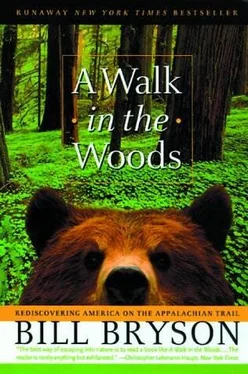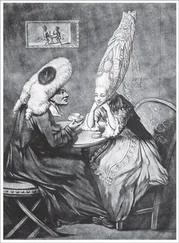Bill Bryson - A Walk In The Woods
Здесь есть возможность читать онлайн «Bill Bryson - A Walk In The Woods» весь текст электронной книги совершенно бесплатно (целиком полную версию без сокращений). В некоторых случаях можно слушать аудио, скачать через торрент в формате fb2 и присутствует краткое содержание. Жанр: Современная проза, на английском языке. Описание произведения, (предисловие) а так же отзывы посетителей доступны на портале библиотеки ЛибКат.
- Название:A Walk In The Woods
- Автор:
- Жанр:
- Год:неизвестен
- ISBN:нет данных
- Рейтинг книги:4 / 5. Голосов: 1
-
Избранное:Добавить в избранное
- Отзывы:
-
Ваша оценка:
- 80
- 1
- 2
- 3
- 4
- 5
A Walk In The Woods: краткое содержание, описание и аннотация
Предлагаем к чтению аннотацию, описание, краткое содержание или предисловие (зависит от того, что написал сам автор книги «A Walk In The Woods»). Если вы не нашли необходимую информацию о книге — напишите в комментариях, мы постараемся отыскать её.
A Walk In The Woods — читать онлайн бесплатно полную книгу (весь текст) целиком
Ниже представлен текст книги, разбитый по страницам. Система сохранения места последней прочитанной страницы, позволяет с удобством читать онлайн бесплатно книгу «A Walk In The Woods», без необходимости каждый раз заново искать на чём Вы остановились. Поставьте закладку, и сможете в любой момент перейти на страницу, на которой закончили чтение.
Интервал:
Закладка:
“Sorry.”
“Forget it. I think maybe I’m still a little, you know, unsettled. I thought I was done for. Lost, no water-and you with the chocolate chip cookies.”
“So how did you get back to the trail?”
“It was a miracle, I swear to God. Just when I was about to lie down and give myself to the wolves and bobcats, I look up and there’s a white blaze on a tree and I look down and I’m standing on the AT. At the mudslick, as a matter of fact. I sat down and had three smokes one after the other, just to calm myself down, and then I thought, ‘Shit, I bet Bryson’s walked by here while I’ve been blundering around in the woods, and he’ll never come back because he’s already checked this section of trail.’ And then I began to worry that I never would see you again. So I really was glad when you turned up. To tell you the truth, I’ve never been so glad to see another person in my whole life, and that includes some naked women.”
There was something in his look.
“You want to go home?” I asked.
He thought for a moment. “Yeah. I do.”
“Me, too.”
So we decided to leave the endless trail and stop pretending we were mountain men because we weren’t. At the bottom of chairback Mountain, four miles farther on, there was a dirt logging road. We didn’t know where it went other than that it must go somewhere. An arrow on the edge of my map pointed south to Katahdin Iron Works, site of an improbable nineteenth-century factory in the woods and now a state historical monument. According to my Trail Guide there was public parking at the old iron works, so there must be a road out. At the bottom of the mountain, we watered up at a brook that ran past, and then started off along the logging road. We hadn’t been walking more than three or four minutes when there was a noise in the near distance. We turned to see a cloud of dust heading our way led by an ancient pickup truck moving at great speed. As it approached I instinctively put my thumb out, and to my astonishment it stopped about fifty feet past us.
We ran up to the driver’s window. There were two guys in the cab, both in hardhats and dirty from work-loggers obviously.
“Where you going?” asked the driver.
“Anywhere,” I said. “Anywhere but here.”
Chapter 21
So we didn’t see Katahdin. We didn’t even see Katahdin Iron Works, except as a glimpsed blur because we shot past it at about seventy miles an hour on the bounciest, most terrifyingly hasty ride I ever hope to have in the back of a pickup truck on a dirt road.
We held on for dear life in the open back, lifting our feet to let chainsaws and other destructive-looking implements slide past-first this way, then that-while the driver propelled us through the flying woods with reckless zest, bouncing over potholes with such vigor as to throw us inches into the air, and negotiating curves as if in startled afterthought. In consequence we alighted at the little community of Milo, twenty miles to the south, on unsteady legs and blinking at the suddenness with which our circumstances had changed. One moment we had been in the heart of wilderness, facing at least a two-day hike to civilization; now we were in the forecourt of a gas station on the edge of a remote little town. We watched the pickup truck depart, then took our bearings.
“You want to get a Coke?” I said to Katz. There was a machine by the gas station door.
He considered for a moment. “No,” he said. “Maybe later.”
It was unlike Katz not to fall upon soft drinks and junk food with exuberant lust when the opportunity presented itself, but I believe I understood. There is always a measure of shock when you leave the trail and find yourself parachuted into a world of comfort and choice, but it was different this time. This time it was permanent. We were hanging up our hiking boots. From now on, there would always be Coke, and soft beds and showers and whatever else we wanted. There was no urgency now. It was a strangely subduing notion.
Milo had no motel, but we were directed to a place called Bishop’s Boarding-house, a large old white house on a handsome street of elegant trees, wide lawns, substantial old houses-the kind of homes where the garages were originally carriage houses with quarters upstairs for the servants.
We were received with warmth and bustling kindliness by the proprietor, Joan Bishop, a cheery, snowy-haired lady with a hearty Down East accent who came to the door wringing floury hands on an apron and waved us and our grubby packs into the spotless interior without a flicker of dismay.
The house smelled wholesomely of fresh-baked pastry, garden tomatoes, and air undisturbed by fans or air-conditioners-old-fashioned summer smells. She called us “you boys” and acted as if she had been expecting us for days, possibly years.
“Goodness me, just look at you boys!” she clucked in astonishment and delight. “You look as if you’ve been wrestling bears!”
I suppose we must have looked a sight. Katz was liberally covered in blood from his fraught stumble through the woods, and there was tiredness all over us, even in our eyes.
“Now you boys go up and get yourselves cleaned up and come down to the porch and I’ll have a nice jug of iced tea waiting for you. Or would you rather lemonade? Never mind, I’ll make both. Now go on!” And off she bustled.
“Thanks, Mom,” we muttered in dazzled and grateful unison.
Katz was instantly transformed-so much so that he felt perhaps a trifle too much at home. I was wearily taking some things from my pack when he suddenly appeared in my room without knocking and hastily shut the door behind him, looking flummoxed. Only a towel, clutched not quite adequately around his waist, preserved his hefty modesty.
“Little old lady,” he said in amazement.
“Pardon?”
“Little old lady in the hallway,” he said again.
“It is a guest house, Stephen.”
“Yeah, I hadn’t thought of that,” he said. He peeked out the door and disappeared without elaboration.
When we had showered and changed, we joined Mrs. Bishop on the screened porch, where we slumped heavily and gratefully in the big old porch chairs, legs thrust out, the way you do when it’s hot and you’re tired. I was hoping that Mrs. Bishop would tell us that she was forever putting up hikers who had been foiled by the Hundred Mile Wilderness, but in fact we were the first she could recall in that category.
“I read in the paper the other day that a man from Portland hiked Katahdin to celebrate his seventy-eighth birthday,” she said conversationally.
That made me feel immensely better, as you can imagine.
“I expect I’ll be ready to try again by then,” Katz said, running a finger along the line of scratch on his forearm.
“Well, it’ll still be there, boys, when you’re ready for it,” she said. She was right, of course.
We dined in town at a popular restaurant called Angie’s and afterwards, with the evening warm and congenial, went for a stroll. Milo was a sweetly hopeless town-commercially forlorn, far from anywhere and barely alive, but curiously likeable. It had some nice residential streets and an impressive fire station. Perhaps it was just that it was our last night away from home. Anyway, it seemed to suit us.
“So do you feel bad about leaving the trail?” Katz asked after a time.
I thought for a moment, unsure. I had come to realize that I didn’t have any feelings towards the AT that weren’t confused and contradictory. I was weary of the trail, but still strangely in its thrall; found the endless slog tedious but irresistible; grew tired of the boundless woods but admired their boundlessness; enjoyed the escape from civilization and ached for its comforts. I wanted to quit and to do this forever, sleep in a bed and in a tent, see what was over the next hill and never see a hill again. All of this all at once, every moment, on the trail or off. “I don’t know,” I said. “Yes and no, I guess. What about you?”
Читать дальшеИнтервал:
Закладка:
Похожие книги на «A Walk In The Woods»
Представляем Вашему вниманию похожие книги на «A Walk In The Woods» списком для выбора. Мы отобрали схожую по названию и смыслу литературу в надежде предоставить читателям больше вариантов отыскать новые, интересные, ещё непрочитанные произведения.
Обсуждение, отзывы о книге «A Walk In The Woods» и просто собственные мнения читателей. Оставьте ваши комментарии, напишите, что Вы думаете о произведении, его смысле или главных героях. Укажите что конкретно понравилось, а что нет, и почему Вы так считаете.












